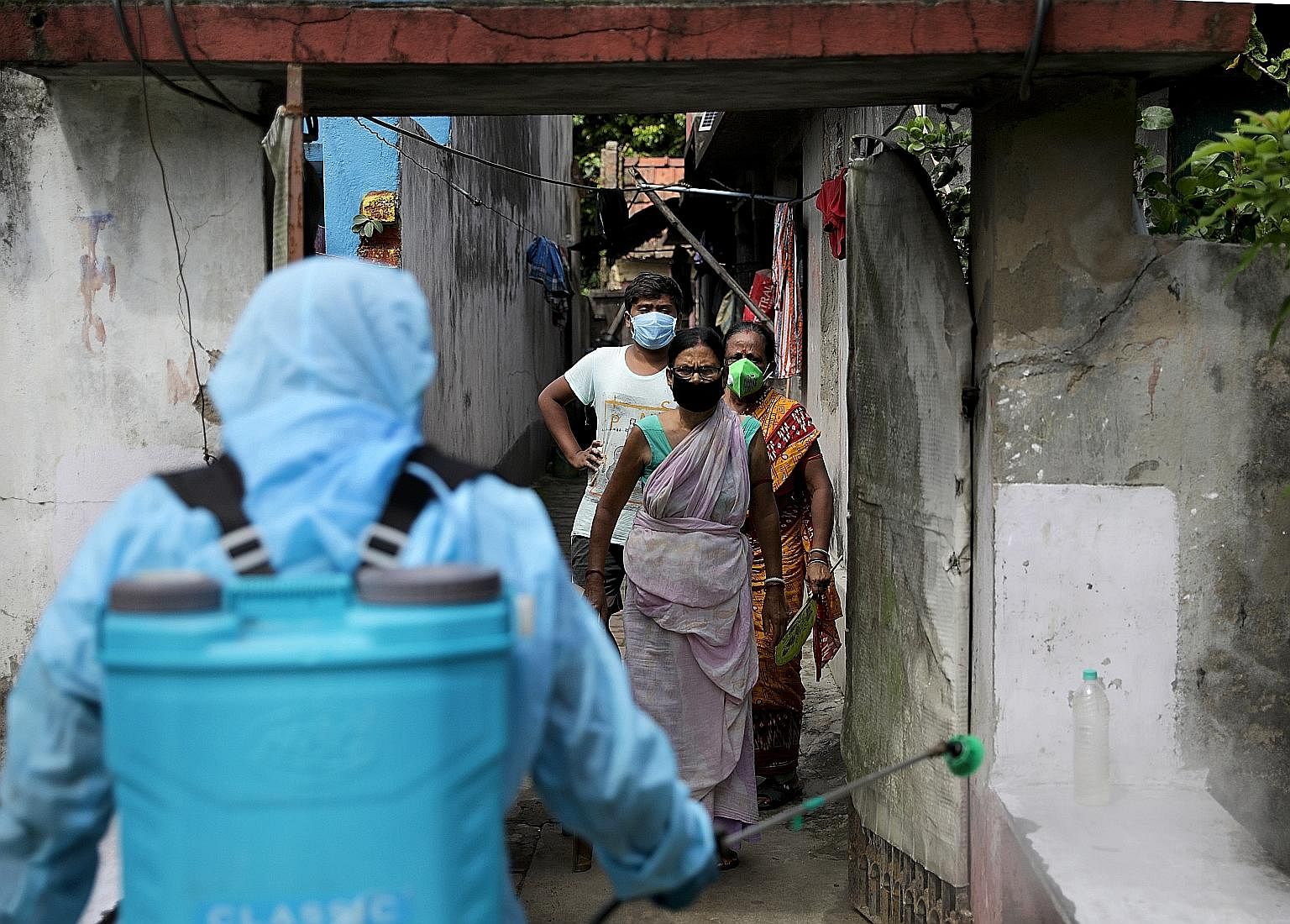NEW DELHI • India hit a milestone yesterday morning that it had made great sacrifices to avoid: recording more than one million coronavirus infections.
The virus has been gnawing its way across this country of 1.3 billion people and gaining speed, fuelled by high population density, an already beleaguered healthcare system and a calculation by the central government to lift a nationwide lockdown in hopes of getting the economy up and running, come what may.
But as India's number of confirmed new infections keeps hitting record highs, many states and cities have been locking down again. In some areas, long lines of bodies snake out of cremation grounds.
India is racking up about 30,000 new reported infections each day - more than any other country except the United States and Brazil, and it is catching up with Brazil.
India now has the third-highest total number of cases - 1,020,644 cases and 25,777 deaths - after the United States and Brazil. Testing remains sparse, so the real figure could be significantly higher.
Researchers at the Massachusetts Institute of Technology estimate that by the end of next year, India will be the worst-hit country in the world.
The virus also appears to be spreading in Indian prisons, sparking outrage after 80-year-old Maoist idealogue and poet Varavara Rao and peasant leader Akhil Gogoi - who is a famous critic of the central government and state government in Assam - were infected while incarcerated.
Schools and universities have been shut since March with no clear plans to reopen, leaving nearly 278 million students without much to do. More than 100 million Indians have lost their jobs.
The economy, which already had been showing deep cracks before the pandemic, is now forecast to contract by as much as 9.5 per cent in the year that began on April 1.
In the early days of the pandemic, Prime Minister Narendra Modi took swift action. He advised mask wearing and social distancing. At a time when India had fewer than 1,000 known infections - although the true figure was certainly higher - he imposed a severe nationwide lockdown that would last nearly three months.
Millions of migrant labourers, who over the years had gravitated to jobs in the cities, suddenly found themselves with little or no work.
They poured out of the cities and back into the countryside, hoping to rely on relatives in their home villages to survive. In the process, they spread coronavirus infections into nearly every corner of India.
-
30,000
Number of new reported infections each day that India is racking up - more than any other country except the United States and Brazil, and it is catching up with Brazil.
278m
Number of students affected by the country's closure of schools and universities since March, with no clear plans to reopen.
>100m
The number of Indians who have lost their jobs.
As the economic pain really began to bite, Mr Modi changed course. Last month, he urged the leaders of India's 28 states and eight territories to "unlock, unlock, unlock".
Public health experts say Mr Modi got it backwards and should have waited until the crisis was further along and then imposed a lockdown.
The worst-hit areas are India's biggest cities, such as Mumbai, New Delhi, Chennai, Ahmedabad and the tech hub of Bengaluru.
Officials in India's north-eastern state of Bihar imposed a two-week lockdown beginning on Thursday after a sudden spike in cases - more than 20,000 in 24 hours. Bihar is a source of migrant labour across India; the surge in Bihar's cases correlates with the return of workers from distant cities.
A sharp rise in cases has also forced a new lockdown in Goa, a state on India's western coast that is famed for its beaches, just a few weeks after it reopened to tourists, a lifeline to the state economy.
The state of Kerala, which had been largely successful in controlling the spread of the virus, also extended lockdown restrictions by a week in its biggest city, Thiruvananthapuram, after cases nearly doubled in just a few days.

Mr Modi and top government officials have repeatedly said in televised speeches that India is doing better than richer countries, especially when it comes to the death rate.
India has reported about 20 virus-related deaths per million people, while many other nations, including the US, Brazil, Spain and Italy, have all lost hundreds per million.
"I don't think it has anything to do with how the government has handled the pandemic," said Dr Anand Krishnan, a professor of epidemiology at the New Delhi-based All India Institute of Medical Sciences.
Instead, he said, it is because India's average population age is younger than that of other countries, and obesity and diabetes, which increase people's vulnerability to the virus, are less prevalent here.
India's Zydus Cadila plans to complete late-stage trials for its coronavirus vaccine candidate by next February or March and could produce up to 100 million doses a year initially if it is successful, the company chairman said yesterday.
"We are looking at about seven or a little more than seven months for the vaccine, provided the data is encouraging and the vaccine is proven to be effective during the trials," chairman Pankaj Patel said in an interview.
NYTIMES, REUTERS












